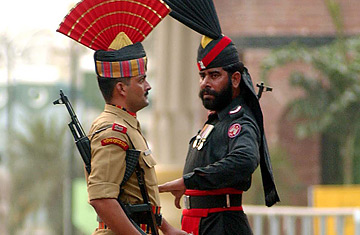
An Indian border security guard (left) faces off with his Pakistani counterpart at the border near Wagah.
At the Wagah border post that separates northern India from eastern Pakistan, the distance between the throngs of Muslims that gather on the Pakistan side and the mostly Hindus and Sikhs congregated on the Indian side is but a few feet. But it feels like miles for those old enough to remember the days when they could walk from one side to the other without ever leaving India. And although the nightly border guard ceremony here may be grounded in a bloody history of partition conflict, for locals and the occasional tourist it remains a symbol of a peaceful back-and-forth between two neighbors who have fought each other in three wars. And for Pakistan, the changing of the flag ceremony represents a rare refuge of decorum amid the swirling chaos that engulfs their country.
To the uninitiated ear, the spectacle that happens each night at Wagah sounds like a crazed soccer match. The sunset that casts a golden hue on the nearby fields of jute and wheat, finds thousands of Indian spectators waiting expectantly, having traveled here via the neighboring Punjabi city of Amritsar, the site of the Golden Temple — Sikhism's holiest place of worship. On the other side, hundreds, if not thousands, of Pakistanis do the same — traveling from the nearby city of Lahore with picnic supplies and children in tow. Young entrepreneurs hawk packs of postcards and small flags. Vendors on nearby streets satiate the thirsts of the crowd with bottled water and cold ice cream sandwiches. The guards hold guns and batons; the people hold cameras and souvenirs. The two crowds meet in a pseudo-stadium overlooking a series of gates and a network of barbed wire dividing them from one another. They've come to cheer for their countries, but implicit in their zeal is an acknowledgment of common ties.
A young girl with a baby blue bandana stands proud and curious, holding an Indian flag twice her height. The struggle to keep it hoisted above her shoulders becomes a struggle to show how much she loves India. She looks as if she doesn't understand exactly what's going on, or why everyone is so loud, but likes it all the same. "Hindustan Zindabad!" she yells in chorus with her compatriots. "Long Live India!" On the other side, the young and old do the same, except their shouts emanate from beneath a frieze of Muhammad Ali Jinnah, the founding father of Pakistan.
Breaking from the roaring crowd is a makeshift line of young men, ready for their chance to hold an enormous flag and run a dash through the melee all the way to the border gate. It takes about ten seconds to run the course, but with the accompanying hoots and hollers, the joy lasts for hours. In fact, the running of the flag is one of the few activities the mustachioed guards on each side allow the spectators to join in. Otherwise, everyone is quickly shuffled into a spot in the adjacent stands to wait for the ceremony to begin. Anyone who gets too close to the gate or sits on a curb not intended for sitting is quickly ushered aside with a shrieking whistle.
As relations between India and Pakistan thaw, business is anticipating a boom around this border crossing. Recently, Indian and Pakistani trucks carrying goods were allowed to cross the border for the first time in years. Also, a bus route has begun between Lahore and Amritsar, a city whose connection to India's rail lines could make Wagah an even larger entry point for visiting Pakistanis. The improved relations means middlemen will be cut from cross-country transactions, causing some to lose their jobs, but many headaches will be averted in the import-export market. Still, whatever the state of cross-border commerce, the main attraction remains the nightly ritual of squaring off across the border.
The actual ceremony, which involves the opening and closing of the border gates and the lowering of each country's flags, attempts to live up to the hectic frenzy of the crowd. Indian guards, in their green and beige fatigues and perfectly coiffed berets, goose-step their way to India's gate, colored saffron, white and green after the country's national colors. The guards are simultaneously stately, with their swaying arms moving in synchronicity, and unusually flamboyant, with their measured strides resembling a forceful power-walk. Pakistan's guards do the same, though their gate is colored a different shade of green and adorned with two crescent moons and adjoining stars, the symbol of Islam. The two contingents meet in the middle — the actual border — and then undertake an elaborate show-off contest. Each soldier is expected to make their mannerisms as over-the-top as possible, be it the calculated clack of a large, black boot or the whirling gesture of an official salute. Imperiousness is key.
At the end of the display, the guards do something so simple, yet profound, that occasionally it's lost on the crowd: They shake hands.
The winner of the bloodless duel is never official, but usually decided by whichever side gains more rapturous cheers from the gathered attendees. No matter the outcome, both Indian and Pakistani alike trek home with smiling faces and vows to return soon — maybe even tomorrow night.
